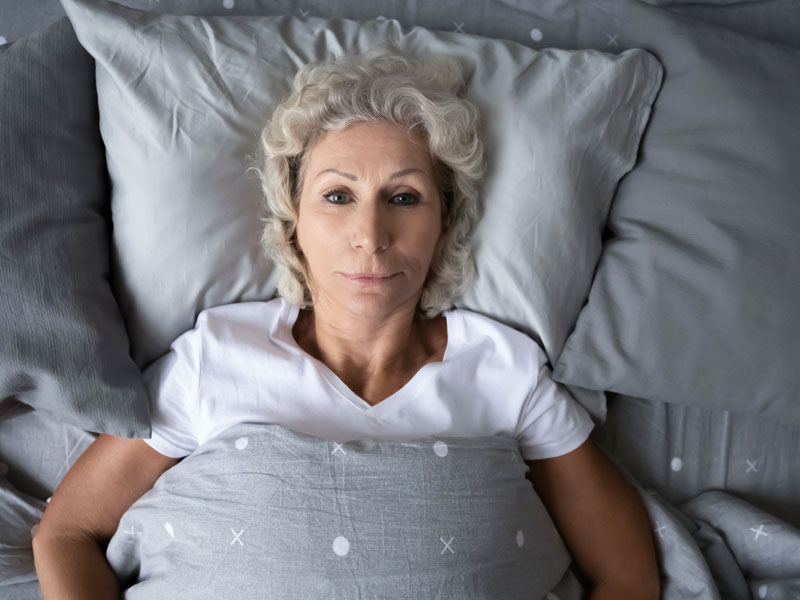
There are certain stages when our body starts reacting differently because of changes going on in the body. Most of them are hormonal changes that affect the conditions and functioning of different organs. Women face similar issue once when their menstruation period starts and once when it ends. Then stage when menstruation period ends is called menopause. This is the time when women no longer produces eggs in the ovaries and hormones affect the body in such a way that is can also cause insomnia. Today let us understand the relation of menopause and insomnia and how does it affect your body with the help of a gynaecologist.
Table of Content:-
Menopause and Insomnia
A woman reaches menopause when she has completed one year without having a menstrual period. Dr. Bindiya Khera, Senior Gynaecologist from Fatima Hospital, Lucknow explains how menopause and insomnia are related. Menopause is divided into two categories pre-menopause and post-menopause. During pre-menopause or it is also said as perimenopause, the ovaries produce less key hormones in the body. These hormones include estrogens and progesterone which causes insomnia.

Insomnia is a disorder that prevents a person from getting adequate sleep. This can either prevent you from sleeping or does not let you stay asleep for long time. This condition results to sleep deprivation and other health issues.
What Symptoms Do You Have in Insomnia?
People having insomnia do not have some particular symptoms. It differs from person to person, those who have it because of menopause have a set of indicators from which you can detect that you are having insomnia. It includes-
- Taking more than 30 minutes to fall asleep
- Waking up too early
- Getting less than 6 hours of sleep on regular basis
- Not feeling refreshed or calm after sleeping
- Feeling sleepy throughout the day
- Worrying about sleep continuously
- Feeling anxious, stressed and irritated
- Having a hard time focussing or paying attention
- Experience more errors or accidents
- Frequent headaches
Factors Affecting Health in Insomnia after Menopause
Women moving to their menopause stage go changes in their body which affects their sleep cycle. Insomnia can affect a person in different ways. Here are some factors you should know about-
Hormone changes
As told by gynaecologist, oestrogen and progesterone levels decrease during menopause that triggers changes in the person and her lifestyle. It affects sleep schedules and duration of sleep of the person. This is because the progesterone is responsible for producing sleep hormones which help you to sleep peacefully. Hence you may find it harder to cope up and sleep.

Hot Flashes
Having hot flashes and sweating during night are the two most common side-effects that affect your sleep during menopause. This happens because there are many fluctuations in the hormone levels that decrease of increase your body temperature quite rapidly. Because of hot flashes you can experience adrenaline rush in your body which keeps the temperature high. This is also responsible to decrease stress and fight-hormones.
Medications
Medicines contain chemicals that sometimes react with the body and make it hard for the person to sleep. These medications or supplements can cause disturbance in sleep especially if you are starting which a new strong medication. Mostly over the counter supplements have this tendency to contribute to a type of insomnia.
Also Read- Narcissistic Personality Disorder: Know Symptoms, Reason And Cure
How can Insomnia be treated during Menopause?
Insomnia can be treated during menopause by controlling the problem of imbalance in hormone levels. If the hormone levels of the person get stabilized, it will automatically improve the condition of insomnia in women. For this there are three methods-
1. Hormone Replacement Therapy- This therapy is used to contribute to estrogens when the natural levels of hormones reduce in the body. This happens mostly at the time of perimenopause or complete menopause.
2. Low dose of birth control- Another method of treating and stabilizing hormone levels is through consumption of little dosage of birth control. Low dose of birth control helps to ease insomnia in women.

3. Giving low dose of antidepressants- Medications like these that can alter your brain chemicals can help you get relief and have peaceful sleep. Menopause results to stress and anxiety and thus anti-depressants reduce that problem.
Also Read- 5 Food Items To keep Your Hormonal Balance in Check
Conclusion
Menopause is the stage when a women stops having menstrual periods. This stage comes along different changes in the body especially hormone changes. It results to lesser amount of estrogens and progesterone levels in the body which gives rise to insomnia. Insomnia is sleep deprivation which affects a person’s health a lot. This can result to factors such as hot flashes, hormone changes etc. It needs to be cured by balancing hormone levels in the body. For that one can choose for hormone replacement therapy, dose of birth control pills or consumptions of some anti-depressants to regulate your sleep cycle. Consult a doctor before going for any treatment.
Read More Articles on Other Diseases
Picture Credits- Pixabay.com
Also watch this video
How we keep this article up to date:
We work with experts and keep a close eye on the latest in health and wellness. Whenever there is a new research or helpful information, we update our articles with accurate and useful advice.
Current Version